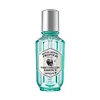What's inside
What's inside
 Key Ingredients
Key Ingredients

 Benefits
Benefits

 Concerns
Concerns

 Ingredients Side-by-side
Ingredients Side-by-side

Propolis Extract
Skin ConditioningPortulaca Oleracea Extract
Skin ConditioningButylene Glycol
HumectantHippophae Rhamnoides Fruit Extract
Skin ConditioningPanthenol
Skin ConditioningRosa Centifolia Flower Water
Skin ConditioningNiacinamide
Smoothing1,2-Hexanediol
Skin Conditioning3-O-Ethyl Ascorbic Acid
Skin ConditioningHamamelis Virginiana Extract
AntiseborrhoeicCentella Asiatica Extract
CleansingRoyal Jelly Extract
Skin ConditioningSpirodela Polyrhiza Extract
Skin ConditioningSodium Hyaluronate
HumectantCarbomer
Emulsion StabilisingArginine
MaskingWater
Skin ConditioningDipotassium Glycyrrhizate
HumectantHydroxyethylcellulose
Emulsion StabilisingAdenosine
Skin ConditioningPropolis Extract, Portulaca Oleracea Extract, Butylene Glycol, Hippophae Rhamnoides Fruit Extract, Panthenol, Rosa Centifolia Flower Water, Niacinamide, 1,2-Hexanediol, 3-O-Ethyl Ascorbic Acid, Hamamelis Virginiana Extract, Centella Asiatica Extract, Royal Jelly Extract, Spirodela Polyrhiza Extract, Sodium Hyaluronate, Carbomer, Arginine, Water, Dipotassium Glycyrrhizate, Hydroxyethylcellulose, Adenosine
Water
Skin ConditioningPropolis Extract
Skin ConditioningHoney Extract
HumectantRoyal Jelly Extract
Skin ConditioningButylene Glycol
HumectantAlcohol
AntimicrobialPentaerythrityl Tetraethylhexanoate
EmollientCaprylic/Capric Triglyceride
MaskingDipropylene Glycol
HumectantCetyl Ethylhexanoate
EmollientPolyglyceryl-10 Dipalmitate
EmollientSqualane
EmollientDiisostearyl Malate
EmollientHydroxyethyl Acrylate/Sodium Acryloyldimethyl Taurate Copolymer
Emulsion StabilisingBetaine
HumectantCyclopentasiloxane
Emollient1,2-Hexanediol
Skin ConditioningEthylhexylglycerin
Skin ConditioningBehenyl Alcohol
EmollientCetearyl Alcohol
EmollientArginine
MaskingGlycerin
HumectantAcrylates/C10-30 Alkyl Acrylate Crosspolymer
Emulsion StabilisingAmmonium Acryloyldimethyltaurate/Vp Copolymer
Dimethicone/Vinyl Dimethicone Crosspolymer
Skin ConditioningCitrus Tangerina Peel Oil
MaskingSorbitan Isostearate
EmulsifyingCitrus Aurantium Bergamia Fruit Oil
MaskingDisodium EDTA
Xanthan Gum
EmulsifyingPelargonium Graveolens Flower Oil
MaskingLactobacillus Ferment
Skin ConditioningSaccharomyces Ferment
Skin ConditioningBoswellia Carterii Oil
MaskingHydrogenated Lecithin
EmulsifyingCeramide NP
Skin ConditioningLavandula Angustifolia Oil
MaskingCitrus Limon Peel Oil
MaskingRosmarinus Officinalis Leaf Oil
MaskingEucalyptus Globulus Leaf Oil
PerfumingCananga Odorata Flower Oil
MaskingCinnamomum Zeylanicum Bark Oil
MaskingCholesterol
EmollientOleic Acid
EmollientLimonene
PerfumingWater, Propolis Extract, Honey Extract, Royal Jelly Extract, Butylene Glycol, Alcohol, Pentaerythrityl Tetraethylhexanoate, Caprylic/Capric Triglyceride, Dipropylene Glycol, Cetyl Ethylhexanoate, Polyglyceryl-10 Dipalmitate, Squalane, Diisostearyl Malate, Hydroxyethyl Acrylate/Sodium Acryloyldimethyl Taurate Copolymer, Betaine, Cyclopentasiloxane, 1,2-Hexanediol, Ethylhexylglycerin, Behenyl Alcohol, Cetearyl Alcohol, Arginine, Glycerin, Acrylates/C10-30 Alkyl Acrylate Crosspolymer, Ammonium Acryloyldimethyltaurate/Vp Copolymer, Dimethicone/Vinyl Dimethicone Crosspolymer, Citrus Tangerina Peel Oil, Sorbitan Isostearate, Citrus Aurantium Bergamia Fruit Oil, Disodium EDTA, Xanthan Gum, Pelargonium Graveolens Flower Oil, Lactobacillus Ferment, Saccharomyces Ferment, Boswellia Carterii Oil, Hydrogenated Lecithin, Ceramide NP, Lavandula Angustifolia Oil, Citrus Limon Peel Oil, Rosmarinus Officinalis Leaf Oil, Eucalyptus Globulus Leaf Oil, Cananga Odorata Flower Oil, Cinnamomum Zeylanicum Bark Oil, Cholesterol, Oleic Acid, Limonene
 Reviews
Reviews

Ingredients Explained
These ingredients are found in both products.
Ingredients higher up in an ingredient list are typically present in a larger amount.
1,2-Hexanediol is a synthetic liquid and another multi-functional powerhouse.
It is a:
- Humectant, drawing moisture into the skin
- Emollient, helping to soften skin
- Solvent, dispersing and stabilizing formulas
- Preservative booster, enhancing the antimicrobial activity of other preservatives
Arginine is an amino acid that is important for human development. Your body uses is it to produce hair keratin and skin collagen.
As a cosmetic ingredient, Arginine has antioxidant properties and can also help repair damaged skin. This ingredient is derived either synthetically or from animals.
Arginine isn't fungal acne safe when used in the presence of other lipids (fats, fatty acids, oils, esters, etc). Oils and fats occur naturally within the skin, so take caution when using Arginine if you're prone to fungal acne.
Learn more about ArginineButylene Glycol (or BG) is used within cosmetic products for a few different reasons:
Overall, Butylene Glycol is a safe and well-rounded ingredient that works well with other ingredients.
Though this ingredient works well with most skin types, some people with sensitive skin may experience a reaction such as allergic rashes, closed comedones, or itchiness.
Learn more about Butylene GlycolPropolis Extract is also known as bee glue.
This ingredient has antimicrobial, anti-inflammatory, wound healing, and antioxidant properties.
Studies show propolis helps fight against bacteria, viruses, and fungi. This may help with reducing acne and accelerate wound healing.
The flavonoids found in propolis extract are potent antioxidants. Antioxidants may help with reducing the signs of aging.
A study from 2020 found propolis to help reverse skin damage from UV.
Fun facts: This ingredient is created by mixing beeswax, bee saliva, and parts of trees. Bees use propolis as a sealant to close any gaps in their hives.
Since it is an animal-derived product, this ingredient is not considered vegan. For vegan alternatives, check out Galactomyces Ferment Filtrate or Centella Asiatica Extract.
Learn more about Propolis ExtractRoyal Jelly Extract comes from a secretion made by worker honeybees. This secretion is white and described as creamy.
This compound has antibacterial, anti-aging, and anti-inflammatory properties.
Studies show Royal Jelly to contain amino acids, fatty acids, and a variety of vitamins, including Vitamin Bs. Many of these components are antioxidants, which help with anti-aging. The fatty acids in Royal Jelly make it a hydrating ingredient.
Several animal studies show Royal Jelly to boost collagen production and reduce inflammation.
The Vitamin Bs found in Royal Jelly include:
Royal Jelly is derived from honeybees. This means it is not vegan.
Learn more about Royal Jelly ExtractWater. It's the most common cosmetic ingredient of all. You'll usually see it at the top of ingredient lists, meaning that it makes up the largest part of the product.
So why is it so popular? Water most often acts as a solvent - this means that it helps dissolve other ingredients into the formulation.
You'll also recognize water as that liquid we all need to stay alive. If you see this, drink a glass of water. Stay hydrated!
Learn more about Water